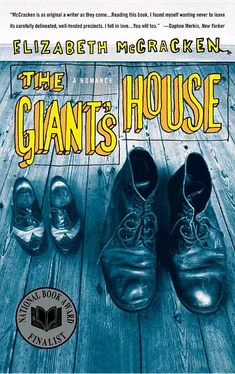There was the winter of 1951, with the bad ice storm (unusual for us) during which, Astoria said, Marie at the post office got stranded and then pregnant with a boyfriend from Hyannis at the only inn open year-round. James was twelve, and just under six foot four. The following winter, there was barely any snow at all, and the used bookstore closed up when the man who owned it shot himself — nobody could understand why, with the weather so pleasant for a change. James turned thirteen. Next, the winter of 1953. His growth was like weather, some years worse than others: he grew six inches between his thirteenth and fourteenth birthdays, and Brewsterville lost power four times in thunderstorms.
Though I wouldn’t have admitted it, what I’d mostly known previously was what everyone did: his height. The tall boy, our town giant. I knew that height well, of course: Astoria had given me the details. When he was a baby, strangers thought he was retarded because he was so slow for his size. The hems on everything he wore were deep as most people’s pockets, so they could be let out, and his pockets were twice as deep as his hems.
I’d been captivated by his height, and the heroic way he seemed to bear it. Now I learned he was interesting in many unconnected ways. I could write an encyclopedia on his enthusiasms and how they accumulated, complete with dates and cross-references.
“What’s your hobby this week?” I’d ask.
“I’m thinking model building,” he’d say. “But not from kits. I want to start from scratch, so I need books on battleships.” Or, “Gardening.” Or, “I want to make my own root beer. Are there recipes for things like that?”
He was fond of the sorts of books that I’d loved as a child, huge omnibuses of humor, pranks, or science experiments. A serious kid most of the time, he allowed himself to get silly at strange moments.
He came in one day wearing a plastic nose, ordered from the back of a magazine, underscored by the falsest moustache I’d ever seen. (All his life, he loved what you could get through the mail. Eventually he had dozens of degrees from correspondence schools and was a mail-order minister several times over.) The nose was beaky and sharp and coming loose at the edges. I said, “You look like the canary who swallowed the cat,” and he laughed his moustache right off. Every now and then he’d approach the desk with a glass of water filled from the bubbler in the hall, and would ask me, in a reasonable tone of voice, to put my hands out or turn my back for a second. I explained to him that I wasn’t born yesterday. Astoria, however, was a perfect pigeon, and I more than once had to rescue her: she’d set her hands, palms down, on the circulation desk, and James had balanced a glass filled with water on each, then whistled his way to the back of the library. James introduced me to my first joy buzzer, and Astoria to her first whoopie cushion. I knew better than to accept candy from him: I knew it would be rubber, or bitter, or explosive.
Nevertheless, I was the town librarian — less a woman than a piece of civic furniture, like a polling machine at town hall, or a particularly undistinguished WPA mural — and even those years had a sameness to them, uninvolved in gossip as I then was. I have had to consult one of those medical charts to see during which year he grew six inches. James was a library patron, then, a cherished one, but when I saw him on the street with his friends, a rare summer sunburn across his nose, or, in the fall, heading toward his house with a bag of groceries, or, in winter, pulling on a knit cap that his mother no doubt insisted on, I was only one of the many people who knew him: everyone knew him. There was no way for him to tell that I noticed the sunburn, that I could summon up Mrs. Sweatt’s voice commanding him not to be foolish, not to catch cold.
My own life went on in this way. I woke up, cleaned my apartment, went to work, came home. I almost always had a book in my hand, to shelve or read or consider.
James’s life went on, too. He grew. That was his life’s work. He got the glasses he needed. His uncle found him a camera, and James carried it by the neck strap all around town. I saw him making his way down the street clicking pictures. The year-rounders were used to him, but tourists stopped and stared.
Summers made even me feel as if I were becoming famous. That is, people took my picture constantly. That is, I kept accidentally stepping into the frame as a tourist took a picture of something else. These are the two truths of tourists: they walk slowly, and they must record their slow progress down the street. I appear in family albums, in slide carousels, sometimes a blur and sometimes a sulky stranger. When I ate my lunch on a bench outside the library, they thought me particularly picturesque, and photographed me on purpose.
They loved James, of course, and asked to take his picture, usually alongside a wife. He allowed it as long as they returned the favor. He really was becoming famous; usually they asked his name so they could write on the back of the snapshot. Mother, Niagara Falls, 1949. Minna, 1950. James Sweatt, Brewsterville, Cape Cod, 1954.
He never recorded the names of the tourists; what made one different from another? He read books on developing photographs. He became a Boy Scout, the world’s biggest. He wrote a prize-winning essay on community service. He played basketball, of course, and was always described as the star. By this they meant, tall. Any number of the words used to describe James just meant tall.
Certainly things could have continued thus, and I would have completed my life never knowing the lack. Or rather, I would have kept my relationship as it was with James, finding him books and recognizing a lack and counting myself lucky for that. Lacking things was what I did; I might as well lack something interesting. I felt in those days quite set apart from the rest of the human race, who regularly got what they wanted and complained anyhow.
On September 3, 1955 (James was sixteen and seven foot six; those are the vital statistics), I was just locking up the library doors after work, doing my usual ritual: check my pocket for the keys, close one of the big oak doors; check my pocket again, in case I was imagining things; close the other; check my pocket. Six steps led up to the library’s entrance. When I stood on the top stair, my head was roughly level with that of the statue of the town founder, which stood in the park across the street.
It was one of those days when the clouds ran past the sun as if they expected it to give chase: instead, Brewsterville’s main street dimmed, then brightened, then dimmed again. A small elderly woman stood at the base of the statue, trying to decide whether to sit down on the green park bench. A teenage boy in bad need of a haircut helped her — did she want to sit down? Was she sure? His hand touched the back of her elbow. I wondered if they were relatives or strangers.
Then the clouds moved along, and the street turned gold, and so did the woman’s hair. It was Mrs. Sweatt, that hair like stained glass; I could almost see the comb marks in it, like mullions. The teenage boy was Caroline Strickland, her own hair cut recently and too short.
Mrs. Sweatt was wearing some kind of strange athletic outfit: bloomers and a zip-up jacket. I considered fishing my keys out and going back into the library. Not that I wanted to avoid them in particular: I wanted to avoid everyone I knew, when I wasn’t in the library, out of that special brand of shyness that borders on arrogance.
But then they sat down and looked up. Mrs. Sweatt pointed at me. “The lady from the library!” Caroline said, so loudly I assumed it was a greeting. There was nothing to do but walk down the stairs and across the street.
Читать дальше












